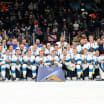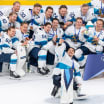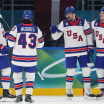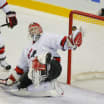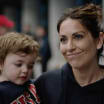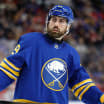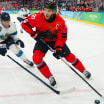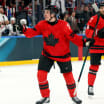Hawerchuk facing surgery after chemotherapy trying to beat stomach cancer
Hockey Hall of Famer tells NHL.com recovery 'like being bag-skated for week solid'
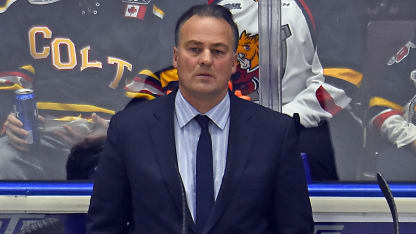
© Graig Abel/Getty Images
"It's like somebody told me, it's like being bag-skated for a week solid," the 56-year-old Hockey Hall of Famer said, comparing his cancer treatment to a drill where players skate for minutes on end, usually with no pucks and prodded by coaches to keep up a pace until leg muscles are spent and lungs burn.
"You just suck it up and do it if you want to make it. If they told you you could make the NHL if you bag-skated for a full week for two months, you'd say, 'OK, I'll do that.' Here, you're trying to save your life, so it's, 'Yeah, I'll do that.'"
He's been doing it ever since the summer when the cancer was discovered.
Hawerchuk felt off in the spring and went to his doctor in June, complaining of acid reflux, no appetite and some weight loss. A first CT scan was negative, but he said he knew something was wrong, so he urged his doctor to keep probing.
Three weeks later, the cancer was found.
He immediately started chemotherapy and had his fourth round on Tuesday.
"It really strips you down," Hawerchuk told NHL.com. "You feel like, man, you don't know if you're going to make it, the chemo hits you so hard. But I'm still young and they're telling me everything else is good, all my organs are good, so I should be able to fight this."
One of the early strategies for his battle was a feeding tube to help him maintain his nutrition and help him fight the effects of the chemotherapy.
"It's been a struggle to eat," he said. "I didn't want [the tube] but my surgeon really insisted. He said, 'Look, you're not eating and you're losing weight.'"
Hawerchuk, selected with the No. 1 pick by the Winnipeg Jets in the 1981 NHL Draft, scored 1,409 points (518 goals, 891 assists) in 1,188 games for the Jets, Buffalo Sabres, St. Louis Blues and Philadelphia Flyers over 16 seasons (1981-1997). He was coach of Barrie of the Ontario Hockey League from 2010-11 until Sept. 3, when the team announced he was taking a leave of absence for medical reasons. He revealed his condition publicly about six weeks later.
In the early phase of his fight, four rounds of chemotherapy are scheduled. He goes for the treatment on Tuesdays, and in the first three rounds it has taken as long as six days for his energy to return. Then there's another week of recovery at his King City, Ontario home before the next round begins.
"With stomach cancer, this chemo they use now has been pretty effective the last few years," he said. "But it's pretty potent. The week after chemo, it's pretty rough. You can't do much.
"That said, I'm encouraged now, because I feel a lot better now than I did a month ago, in the second week of my chemo. Now I'm getting a bit more of an appetite and I feel like I can get out and do a few things. Still using the feeding tube at times but it just feels like it must be shrinking because I've got room to get food in now. So that part's encouraging.
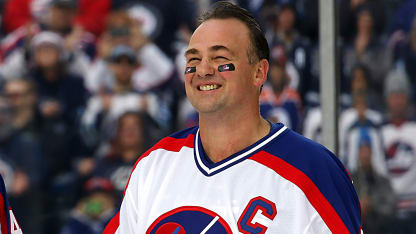
© Jonathan Kozub/Getty Images
"But the battle, too, is the surgery. It's a major surgery."
Once Hawerchuk stabilizes after the fourth round of chemotherapy this week, he will undergo scans to gauge its effectiveness. If the tumor is sufficiently reduced, surgery to remove some or possibly all of his stomach would be the next step.
"It is possible they'll take out the whole stomach, but they can rejig it, hook up to your intestines," Hawerchuk said. "I've talked to people about it. You just eat less and more often, maybe six or seven times during the day. But they're leading normal lives."
While he is determined and focused on his own battle, Hawerchuk said he's mindful of the timing, that it's Hockey Fights Cancer month.
He wants to do what he can to increase awareness and said being proactive is the smartest thing anyone can do.
"I think once you start hitting in your 40's, you should start doing annual checkups," Hawerchuk said. "You've got to be insistent, too. I've talked to a lot of people and doctors don't assume it's cancer. Because mine was acid reflux and loss of appetite, we thought maybe it was an ulcer. At the end of the day, once you have symptoms, you'd better get in there. But before you even have symptoms, you should be doing annual checkups for sure.
"Because it's in my stomach, and it's pretty aggressive, for me the hardest part is that since July, I've gone from nearly 230 pounds to 180. My weight has stabilized but it might have been part of my issue ... a little heavy, but who knows? With cancer, it doesn't show up early. That's the problem. The only thing you can do, once you get to a certain age, is do annual checks. I think that age is lower right now. And it used to be one in six, one in five but now they're talking one in three people are getting cancer of some form. So, get checked."
One of the connections Hawerchuk intends to make soon is with Eddie Olczyk, NHL Hockey Fights Cancer Ambassador for 2019-20. They were never teammates during their careers but were as Jets alumni for the 2016 Tim Hortons NHL Heritage Classic alumni game in Winnipeg.
Eddie Olczyk on his journey of fighting colon cancer
Olczyk was diagnosed with colon cancer in August, 2017, but has been free of cancer since March, 2018.
"We've been missing each other a little bit," Hawerchuk said. "But I know he's talked about the same things. It's encouraging, a guy like Eddie who fought it and beat it. He battled and you've got to be ready to battle and fight. You know there will be ups and downs, but you just have to push through. I can't imagine going through any of this by myself."
Hawerchuk's wife Crystal and their children Eric, Alexis and Ben have been his pillars of support during his struggle.
"My family's been great and it's kind of like hockey," he said. "It's a team effort to beat this. You can accomplish a lot yourself, but you can accomplish so much more when you do it as a group."
One of the tangent challenges of Hawerchuk's cancer diagnosis is that he has plenty of time on his hands. After the initial shock of the diagnosis then the establishment of his treatment plan, there is no shortage of quiet hours thinking about anything and everything.
"So, you need a plan [for that]," he said. "I said to myself that I was going to get into watching the NHL a lot and I'm watching the Barrie Colts and I'm staying in touch with them. I have a hard time going to the rink because the cold affects me and I don't want to end up with some kind of pneumonia or something. I have to be careful that way. But all that stuff keeps me real busy and when I'm feeling good, I'm immersed in it.
"There are other times I can't even watch, just trying to rest and have no energy, usually the first few days after chemo. But that's giving me something to look forward to, something to dive into."
Another reality of his days in treatment has been the amount of outside encouragement he's received from teammates, friends, acquaintances and even people he doesn't even know.
"It's been incredible," he said. "So many people. People have been reaching out from the hockey world, outside the hockey world, so many people that I've come in contact with. A lot of people that have beaten cancer and people I don't even know. It's encouraging and I can tell you, it helps a lot.
"Some of it's been tough. You get a voice mail, or you're texting back. And you think as you're fighting this, 'Am I going to see that person again?' Or, 'Am I going to talk to that person again?' You just have to stay positive. And I just want everyone to know I'm grateful for the support and to let them know I'm battling away and hopefully I'll be out at a Jets game in the New Year."
